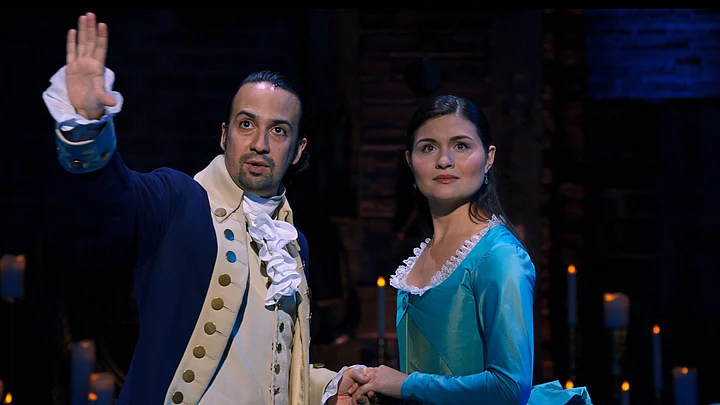Lin-Manuel Miranda’s Hamilton: An American Musical holds little significance for its Indian viewers. No matter how obsessed we might be with Western culture and politics, we couldn’t care less about America’s origin story. But here’s the thing - Hamilton might have American history at its heart, but the experience itself is not limited to that.
Five years after its debut, the out-of-reach Broadway musical conceived by Lin-Manuel Miranda (playwright, actor, composer) and directed by Thomas Kail is finally making its way to the small screens. A recorded film version of it, which was performed in 2016, will drop on Disney+ Hotstar on 3 July. The entire play is divided into two acts - it can be a long, overwhelming watch so be prepared.
The Plot
Featuring a multi-racial cast, Hamilton tells the story of Alexander Hamilton, “a bastard, orphan, son of a whore and a Scotsman,” along with a few other founding fathers of the USA, namely George Washington, Thomas Jefferson, and James Maddison. The musical begins with an enthusiastic Alexander Hamilton befriending four men who will go on to play prominent supporting characters in the play - Aaron Burr (Leslie Odom), Marquis de Lafayette (Daveed Diggs), John Laurens (Anthony Ramos), and Hercules Mulligan (Okieriete Onaodowan). Diggs, Ramos and Mulligan also play the 33rd US President Thomas Jefferson, Hamilton’s son Philip, and the 4th US President James Madison respectively.
Hamilton is primarily the story of Alexander Hamilton. His struggle as an orphan with an undying passion for fighting the war and his journey to prominence as he becomes George Washington’s right-hand man. His relationship with his wife Eliza and the other Schuyler sisters are insightful. But it’s his lukewarm rivalry, and great chemistry, with Aaron Burr that brings the entire show together.
A Contemporary Take on History
Lin-Manuel Miranda’s story of Hamilton is an exciting watch for multiple reasons. There’s something very fascinating about watching 18th-century American men, dressed in breeches with their hair neatly pushed back, and women, dressed in corset gowns, rap and sing their way through life. Miranda’s lyrics are as contemporary as it can get. He’s cheeky and humorous just when it’s needed, and knows exactly when to be cautious with his creative liberties.
Hamilton’s story is presented through a modern gaze (with subtle references to slavery, immigration, feminism etc) but at no point does Miranda overdo it.
Of course, history textbooks would probably give you a more elaborate and nuanced background of Alexander Hamilton. But Miranda’s version isn’t all that bad. Even though the focal point of the play is Hamilton’s work as a Founding Father and the legacy he left behind, the play does not idealise him. His flaws (he has many) and his virtues are both presented in equal depth. What makes Hamilton worth remembering is also what causes his downfall, and Miranda is careful about approaching the character with a neutral tone.
Don’t Need To Care About Hamilton to Enjoy Hamilton
I obviously haven’t seen the live stage production but I think the film version is also pretty good. It seems to capture the thrill of a live performance while giving us the best angles. Since it was recorded in front of a live audience, there are a lot of reactionary laughs that make the experience even more real.
While some basic knowledge about American history might help you absorb the film better, it’s not necessary. The first time I watched Hamilton (a pirated version) almost three years ago, I had zero context but the music, pace, narrative, and performances kept me going. When I read up on Alexander Hamilton after watching the play, I was able to appreciate it more but like I said - it’s a good watch even if you don’t have the context. Although having Wikipedia handy just in case you lose track might help.
For, roughly, the first two hours of the film, the tone is light and fun.
The seriousness of the American Revolution and the political one that follows are balanced out by hopeful characters and their collective struggle to build a nation from scratch.
In the last 30ish minutes, a bit of well-deserved melancholia seeps in - which is not entirely surprising because Miranda gives away the climax at the very beginning of the play. The thrill, however, is not in watching climax sequences, it’s in the almost-three-hour-long journey that leaves you incredibly satisfied. And of course, the beautiful soundtrack!
(At The Quint, we question everything. Play an active role in shaping our journalism by becoming a member today.)
